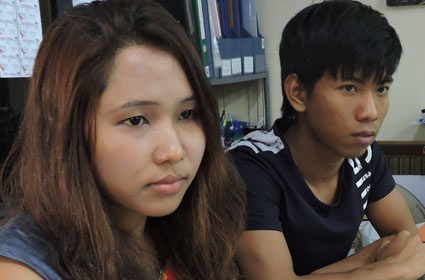Questions to youth migrants have been included by UNFPA as part of an in-depth review of its support to youth in rural areas of Myanmar. This year's theme of International Migrant's Day, "Saving Migrant's Lives", is highlighting the main challenge UNFPA is facing when developing a new strategy for its youth support in rural areas. It calls for more attention from all relevant stakeholders, as initial findings are alarming. In a country in transition, reproductive health is more than ever important for securing a safe life and preventing avoidable pregnancy related death and disability.

Today, December 18th, the world marks International Migrants Day 2014. This year's theme points the focus on the global humanitarian challenge posed by the plight of thousands of migrants who die while trying to reach safety because of conflict or natural disaster, or aiming a better future at a new destination within their country or abroad. Especially youth migrants are among the most vulnerable groups. Given the high proportion of rural population in Myanmar of about 70% on the one side, and a high proportion of youth in the country estimated to be 30% on the other side the rural youth migrants of the country are among the most marginalized groups. UNFPA is currently conducting an in-depth review of its youth projects in rural areas, both in conflict and non-conflict areas of Myanmar, and has included a separate evaluation of the needs of past, current and future youth migrants.
UNFPA has conducted a range of one-to-one interviews in Rakhine, Bago and Yangon, together with supplementing comprehensive assessment tools, speaking with a variety of youth migrants with different background and aspirations. Some are waiting for their departure to work in goldmines in Kachin, some are in preparation to start a long awaited student life in an urban area far away from home, while others just returned and soon will depart again, trying their luck in places far away, such as Malaysia or Korea. Some are always on the roads, working as truck drivers throughout the country. What most of them share is, that they are unprepared in terms of their vulnerability about issues related to sexual reproductive health and HIV. They expressed a need for more knowledge before going in search for a better future.

Previous UNPFA-supported youth projects in rural areas have contributed to improving migrants' lives through preventing unsafe abortions and new HIV infections through outreach activities and counseling. The findings of the review call for a new strategy and upscaling of support. UNFPA's successful support to urban youth has already attracted youth migrants from other Regions of Myanmar. Some have been part of the Youth Development Programme's (YDP) training programme called "Happy Healthy Adolescence Life", at the Myanmar Medical Association, others are now working as peer educators. "I am from Bago Region, I did not know anything about reproductive health issues before attending the YDP", a young female migrant explains. The YDP consists of training on reproductive health issues with focus on behavior change communication as well as life skill training. " What I learned in the YDP was simply to change my behavior and gain knowledge. Many of my friends back at home have bad behavior and don't know anything. Here I also feel like being in a family", says a young male migrant, originating from a rural area of Ayeyarwaddy, waiting for his departure to Korea. He moved to Yangon to learn English and IT skills and has been working as peer educator now for 6 month.
After a completing the in-depth review, UNFPA will develop its strategy for reaching youth and marginalized groups among youth such as young migrants, sex workers and HIV infected. Moreover, the release of census data will be an important tool to set new targets and measurements as numbers of youth and of domestic migrants will be available. New IOM data show that 2014 will be the deadliest year on record for migrants worldwide. The final figure, when published on December 18th, will likely be close to 5,000 - more than twice the 2,378 deaths across the world reported last year.
UNFPA globally, is prioritizing migrants among populations that are more vulnerable and marginalized, especially in terms of their health and their ability to participate in decision making. However, statistics on maternal death, death caused by unsafe abortions and HIV infections are difficult to make, given the often undocumented or poor documented life of migrants at their new destination. In Myanmar data on youth migration is scant and mostly unreliable.
UNFPA Strategic Plan 2014-2017, http://www.unfpa.org/resources/strategic-plan-2014-2017.



